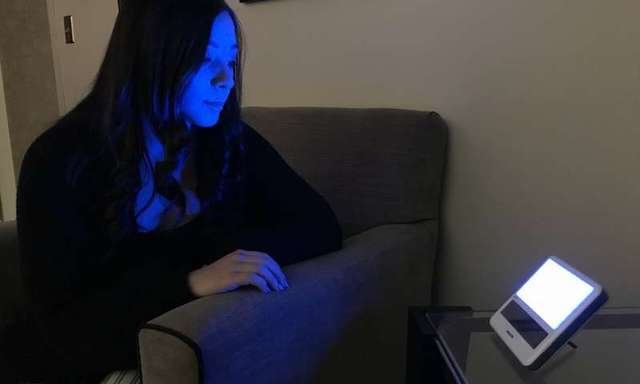
In a new study, researchers found that early morning blue light exposure therapy can aid the healing process of people impact by mild traumatic brain injury.
The research was conducted by a team from the University of Arizona.
Mild traumatic brain injuries, or concussions, are often the result of falls, fights, car accidents and sports participation.
Among other threats, military personnel can also experience mTBI from exposure to explosive blasts:
Shockwaves strike the soft tissue of the gut and push a burst of pressure into the brain, causing microscopic damage to blood vessels and brain tissue.
Those with a concussion or mTBI might momentarily seen stars, become disoriented, or even briefly lost consciousness following the injury.
However, loss of consciousness doesn’t always happen and many people who sustain a concussion are able to walk it off without realizing they have a mild brain injury.
Headaches, attention problems, and mental fogginess are commonly reported after head injuries and can persist for weeks or months for some people.
Few, if any, effective treatments for mTBI exist. The U.S. Army Medical Research and Development Command funded the research to find alternatives to medicinal methods of mTBI recovery.
Recent research has shown that the brain repairs itself during sleep, so the team sought to determine if improved sleep led to a faster recovery.
They tested adults with mTBI used a cube-like device that shines bright blue light (with a peak wavelength of 469 nm) at participants from their desks or tables for 30 minutes early each morning for six weeks. Control groups were exposed to bright amber light.
As a result of the blue light treatment, participants fell asleep and woke an average of one hour earlier than before the trial and were less sleepy during the daytime.
Participants improved their speed and efficiency in brain processing and showed an increase in volume in the pulvinar nucleus, an area of the brain responsible for visual attention.
Neural connections and communication flow between the pulvinar nucleus and other parts of the brain that drive alertness and cognition were also strengthened.
The team says blue light suppresses the brain production of a chemical called melatonin.
When people are exposed to blue light in the morning, it shifts their brain’s biological clock so that in the evening, their melatonin will kick in earlier and help them to fall asleep and stay asleep.
Daily exposure to blue wavelength light each morning helps to re-entrain the circadian rhythm so that people get better, more regular sleep.
That improvement in sleep was translated into improvements in cognitive function, reduced daytime sleepiness, and actual brain repair.
The team plans to continue their research to see if blue light improves sleep quality and how light therapy might affect emotional and psychiatric disorders.
The lead author of the study is William D. “Scott” Killgore, psychiatry professor in the College of Medicine—Tucson.
The study is published in Neurobiology of Disease.
Copyright © 2019 Knowridge Science Report. All rights reserved.



